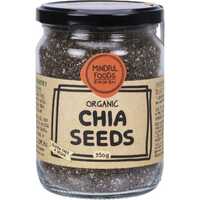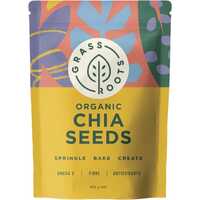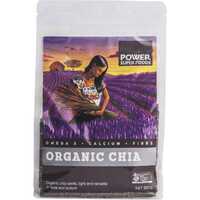Over recent years, a number of foods have gained popularity in the health food community. Many of these products are heralded as "superfoods", and versatile chia seeds are among the most popular. This tiny but powerful food source is sometimes called the "miracle seed", with numerous antioxidants, minerals, and omega-3 fatty acids packed into a distinctive gel-like shell. Great in smoothies, delicious in cereal, and fantastic in salads, chia seeds are an ancient staple and nutritious modern delight.
Let's review chia seeds in detail, from their rich history and powerful nutritional profile to their numerous health benefits.
What are Chia Seeds?
Chia seeds are the edible seeds of two distinct but related plants: Salvia hispanica and Salvia columbariae. Both of these flowing plants are part of the mint family, and they're native to central and southern Mexico and the southwestern United States. Chia seeds are oval in shape, and they're coloured grey with black and white spots. These seeds are rich in nutrients, and they're tiny at just 2 mm in diameter. Chia seeds are hygroscopic, which means they can absorb many times their weight when absorbed in liquid.
The History of Chia Seeds
Chia seeds may be a relatively recent addition in health food stores, but they have a long history that spreads across South America. These seeds were a staple in the ancient Aztec and Mayan diets, and they've remained a popular ingredient to this day. When Jesuit people visited the Aztec regions of South America for the first time, chroniclers listed chia seeds as the third-most important crop behind corn and beans.
Chia is the ancient Mayan word for “strength”, and these seeds also have links with endurance. Ancient Mayan and Aztec warriors used chia seeds as their sole food source when travelling long distances, with their health benefits and small size providing the ultimate in nutritional efficiency. Chia seeds also fulfilled an economic and religious purpose, with the Aztec priesthood often paid in chia seeds, which were offered to gods in religious ceremonies.
The Modern Chia Seed Industry
The modern cultivation of chia seeds still centres around South America. They are regularly consumed in Argentina, Bolivia, Guatemala, Mexico, and Paraguay, where whole seeds and ground products are used to make a variety of nutritious foods and drinks. Chia seeds also have an interesting history in the west. If you remember the "ch-ch-chia" jingle from the 1980s, you're probably familiar with the sprouting grass "hair" products it was used to sell. Chia seeds grow thick and fast in a matter of hours, and they were sold as a novelty at the time.
It took 10-20 years for the western world to wake up to the nutritional wonders of these fabulous seeds. In the 1990s, a group of scientists, nutritionists, and farmers collaborated in an effort to increase the commercial production of chia seeds. As health awareness and vegetarian lifestyles became more popular around the turn of the century, the western world slowly rediscovered the lost nutritional value of Aztec and Mayan traditions.
The Nutritional Profile of Chia Seeds
Chia seeds contain 138 calories per ounce, which is 28 g. By weight, they consist of 6% water, 46% carbohydrates, 34% fat, and 19% protein. They also have lots of fibre, at 83% of the total carbohydrate content.
The following nutrients are included in 100 g of chia seeds:
- Calories: 486
- Water: 6%
- Protein: 16.5 g
- Carbohydrates: 42.1 g
- Fibre: 34.4 g
- Energy: 2030 kJ
- at: 30.7 g
Chia seeds contain the following healthy fats:
- Saturated: 3.33 g
- Monounsaturated: 2.31 g
- Polyunsaturated: 23.67 g
- Omega-3: 17.83 g
- Omega-6: 5.84 g
- Trans: 0.14 g
Chia seeds provide high levels of the following minerals:
- Calcium: 631 mg
- Iron: 7.72 mg
- Magnesium: 335 mg
- Phosphorus: 860 mg
- Potassium: 407 mg
- Zinc: 4.58 mg
- Manganese: 2.72 mg
Chia seeds have zero sugar and are free of gluten.
Nutritional Benefits of Chia Seeds
Consuming chia seeds offers numerous health benefits, from reducing inflammation to fighting disease and promoting fullness. These seeds have also been found to reduce cardiovascular risk factors associated with heart disease, diabetes, and other chronic conditions. Chia seeds have also been shown to improve blood sugar control and reduce insulin resistance in animal studies, which are two other risk factors associated with diabetes and heart disease. According to another study, bread made with chia seeds causes a reduced blood sugar response compared with more traditional bread.
Antioxidants
Antioxidants play an important role throughout the body. They help to fight free radicals, which are responsible for the onset and growth of numerous diseases. Some of the components in chia seeds help to fuel beneficial physical processes and prevent cells from damage. For example, chlorogenic acid may help to lower blood pressure, quercetin may reduce the risk of heart disease and certain cancers, and caffeic acid may help to fight various inflammatory conditions.
Minerals
Chia seeds are a great source of natural minerals, many of which offer health benefits. For example, manganese is used for growth and development, copper is essential for heart health, and phosphorus helps to support healthy bones and tissues. The other minerals in chia seeds also play a powerful role, with iron used to transport oxygen throughout the body; and calcium used for the growth and maintenance of bones, muscles, and nerves.
Protein
With 19% protein, chia seeds are a great source of beneficial amino acids. While this number is roughly the same as other seeds, it's much higher than most grains and cereals. Protein is essential for muscle growth and repair, and it also helps to promote feelings of fullness. With so much protein packed into such a small footprint, eating chia seeds regularly may help people to reduce food intake and manage weight outcomes.
Fibre
Chia seeds have lots of fibre, with 28 grams of seeds boasting 11 grams of fibre. This is a significant portion of the Reference Daily Intake (RDI) for women and men, which is listed at 25 and 38 grams respectively. In fact, over 80% of the carbohydrate content in chia seeds is fibre, some of which will be fermented in your gut to promote the formation of short-chain fatty acids (SCFAs).
Healthy fats
Chia seeds are quite fatty, but unlike most fatty foods, they have a high proportion of heart-healthy omega-3 fatty acids. Roughly three-quarters of all fats in chia seeds contain omega-3 alpha-linolenic acid (ALA), and most of the rest are omega-6 fatty acids. Both of these fats have positive effects, including a reduction in body inflammation. The low ratio of omega-3 fats to omega-6 fats has been linked to reduced rates of heart disease, cancer, and many inflammatory diseases.
Omega-3 fats are good for your body and great for your brain, and chia seeds are an excellent source. To be effective, however, the ALA content needs to be converted into active forms such as eicosapentaenoic acid (EPA). Not only are chia seeds a great source of ALA, but they also have lots of EPA, so your body can actually use it. According to studies, chia seeds may raise blood levels of ALA and EPA up to 138% and 39% respectively.
How to Consume Chia Seeds
Chia seeds have a mild nutty flavour, and they complement both sweet and savoury dishes. They're great added to cereals and smoothies, and they go well mixed into yogurt or sprinkled onto salads. If you're adding chia seeds to a drink, porridge, or wet dish, they swell up while retaining a delicious crunch. Because the seeds turn into a gel-like substance, they can also be useful for thickening desserts.
Chia seeds are incredibly tiny and nutrient-rich, which makes them a great addition to many recipes. From stir fries and pasta dishes to pancakes and banana bread, they go well with pretty much anything. Chia seeds work particularly well when combined with salad dressing ingredients, including vinegar, olive oil, honey, and lemon juice. They're also a regular ingredient in many commercial food products, such as health bars, balls, and bites.
If you're looking for high-quality chia seeds at a competitive price point, Healthy Being is here to help. We have lots of great chia seed products to choose from, including organic seed packets in multiple sizes. So visit our website today and enjoy free shipping options across Australia and worldwide delivery!


 Certified Organic
Certified Organic Vegan Friendly
Vegan Friendly  Vegetarian
Vegetarian Organic Ingredients
Organic Ingredients Dairy Free
Dairy Free Gluten Free
Gluten Free Keto Friendly
Keto Friendly

































